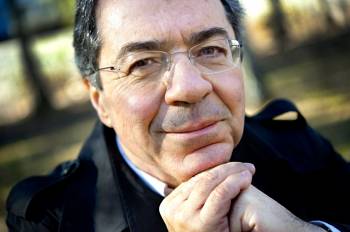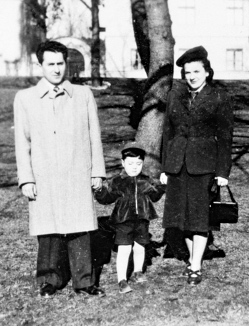NOTE: This memoir was WINNER of the August Prize, Sweden’s prize for Best Book of the Year, in 2012.
“You [survivors] are all very lonely, I imagine. As lonely as the inhabitants of the Warsaw ghetto when they heard the music and laughter from the carousel in Krasinski Park. As lonely as the last people in a world that no longer exists, and which the people in the world that now exists have already forgotten. Even before the fire is out, they’ve already forgotten the flames. You are very lonely at the station at Radogoszcz.”—Goran Rosenberg, speaking to the memory of his father.
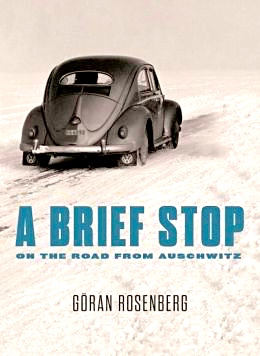 Imagining his father waiting at the train station outside of Auschwitz from which he was just liberated, Swedish author Goran Rosenberg, the child of two Jewish Holocaust survivors from Poland, has decided to begin his memoir about his father with his father’s journey to Sweden, where he plans to live but where he knows no one. There, his father will close the book on his incarceration at Auschwitz and his earlier life in Poland and settle down to make a new life. In his early twenties and weighing just over eighty pounds when he arrives in Sweden, David Rosenberg must find and then arrange for his future wife Hala to join him after a two-year separation. She was trapped in the starving ghetto of Lodz while he was imprisoned at Auschwitz. In Sweden, he finds work in Sodertalje, a small industrial town, as a pipe-fitter for a company that makes trucks. Eventually, he and Hala reunite and marry, settling into life in a one-room apartment in the building below the railroad station where David first arrived in 1947. For Goran, the son later born to them, “This [town] is the Place. This is where my world assumes its first colors, lights, smells, sounds, voices…This is the Place that will continue to form me even when I’m convinced that I’ve formed myself.”
Imagining his father waiting at the train station outside of Auschwitz from which he was just liberated, Swedish author Goran Rosenberg, the child of two Jewish Holocaust survivors from Poland, has decided to begin his memoir about his father with his father’s journey to Sweden, where he plans to live but where he knows no one. There, his father will close the book on his incarceration at Auschwitz and his earlier life in Poland and settle down to make a new life. In his early twenties and weighing just over eighty pounds when he arrives in Sweden, David Rosenberg must find and then arrange for his future wife Hala to join him after a two-year separation. She was trapped in the starving ghetto of Lodz while he was imprisoned at Auschwitz. In Sweden, he finds work in Sodertalje, a small industrial town, as a pipe-fitter for a company that makes trucks. Eventually, he and Hala reunite and marry, settling into life in a one-room apartment in the building below the railroad station where David first arrived in 1947. For Goran, the son later born to them, “This [town] is the Place. This is where my world assumes its first colors, lights, smells, sounds, voices…This is the Place that will continue to form me even when I’m convinced that I’ve formed myself.”
From the earliest beginnings of his life, Goran Rosenberg has been aware that his world is very different from that of his parents, that “they carry an entirely different world around with them…A great deal of what they can’t remember, or don’t want to remember, they cannot forget.” Everything reminds them of something else and somewhere else, and it is the child who is the only thing that binds them to the Place. If the child can make the Place his own, “a new world becomes possible for them as well,” and maybe they will find themselves becoming residents instead of simply “survivors.” They make sure that the boy speaks Swedish and not Polish or Yiddish, that he has books and goes to school and has friends and gets in trouble with them, like any other boy. As Goran grows up, however, he becomes increasingly aware that his father seems to have neither past nor future, that the town in which they live provides no link to his father’s life elsewhere, no common language, no family, no long-time friends, no memories, and no sense of home. And there are always shadows, hovering.
The author’s decision to trace every aspect of his father’s life in an effort to understand him better and to understand not just the horrors of the Holocaust, but also the horrors of survival in a world that is determined to forget, gives his memoir a sharp focus, unlike so many other books about the war which concentrate more on the Holocaust than on the “recovery.” Goran Rosenberg wants to know how his father’s ability to survive these horrors was affected by everything that happened before, during, and after the war, and especially by the institutionalized failure of most of the world to acknowledge and atone for the horrors. A journalist and researcher, Goran Rosenberg delves into records throughout Europe to find answers, raising questions about the elements of chance that led some people to survive and some to be exterminated or die from disease or starvation; about the “invisible wall” between survivors, like his father, and the residents of their town; about the lack of enough Jewish citizens in town to enjoy a “Jewish life” or to celebrate holidays; about the restlessness, the need to travel, and the constant desire to move elsewhere in an effort to find a “home” in the aftermath of war; and, ultimately, about the “forgetfulness” of the other residents of the community.
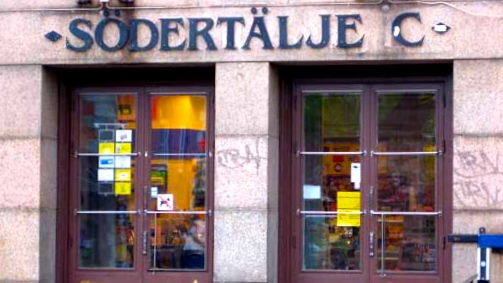
This photo from Sodertalje accompanies a recent PBS story which is entitled, ironically, “Sweden: Safe Haven for Iraqis.”
The book unspools in a circular fashion which follows themes and patterns, instead of a chronological timeline, as the author recreates the lives of the family, especially that of David Rosenberg, his father, within their environment in Sodertalje. The author’s own memories from about the age of three until the present provide a perspective on his father which, in its innocence, becomes particularly affecting. Readers will see difficulties in events which Goran, in his innocence, accepts as just part of his life, and as Goran-the-author provides serious research, facts, and figures about survivors and their problems, and specific stories about his father’s own search for satisfaction in a new world, the sadness of his seeming failure becomes increasingly moving, fraught with emotion.
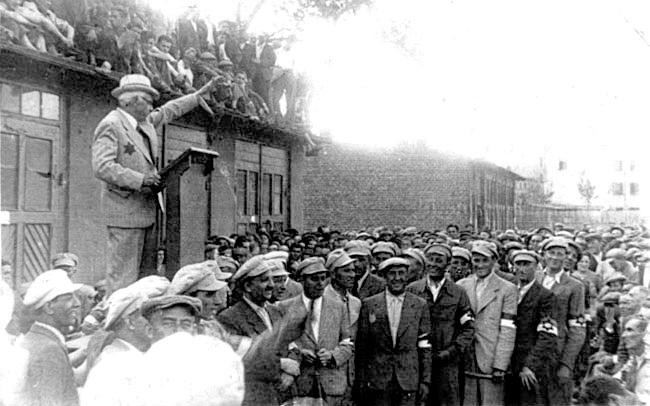
Mordechai Rumkowsky, the “Emperor of Lies,” was the Jewish Mayor of Lodz during the Nazi occupation. His decisions to sacrifice some of his people “for the good of the whole” are among the horrors noted here.
A ray of hope emerges for all the survivors when the West German government is required by the victorious powers to compensate the survivors of atrocities with money. “To be considered for German reparations the survivors have to prove that their time in Auschwitz, Stutthof, Wobbelin or their equivalents has inflicted permanent damage” – defined as 25 percent of their capacity for work. Psychological damage does not count. As it is the German state itself which decides which survivors receive reparations and how much, it will come as no surprise that long, complicated forms, to be written in German, must show in minute detail the survivor’s “25 percent damage” as a result of Hitler’s policies. Certified transcripts of witness statements and certified copies of medical records by physicians who will attest to the damage, in German, are also required. If a statement is inexact or incomplete, the reparations are refused. Likewise, if a record is missing as a result of the war, reparations are refused. “The slightest error can turn the survivor into a liar and a fraud.” And after all, how does one determine the “25 percent of work capacity”? For the survivors, the process of applying for reparations “does as much harm as good,” and many readers will be appalled to read the stories of how these damaged survivors are treated – once again.
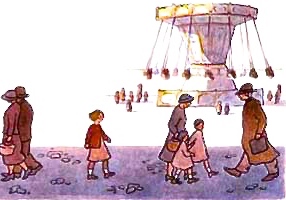
“From the carousel in Krasinski Park in the spring of 1943, you can see and hear the liquidation of the Warsaw ghetto.”
Goran Rosenberg’s memoir, monumental in its insights into post-war survival, clear and unequivocal in its presentation of facts, and artistic and beautiful in its writing, involves the reader emotionally and makes the Rosenberg family story, with its difficulties and its triumphs, more than the story of one family, however much we want them to succeed. Through this memoir, Goran Rosenberg makes them symbolic of all the survivors of this terrible war as they try also to survive their survivorhood.
Note: Translator Sarah Death retains the clarity and realism of this memoir while also conveying the emotional power of a writer’s story of his father’s damaged life.
Photos, in order: The author’s photo appears on http://hbl.fi/kultur/
The picture of David, Goran, and Hala Rosenberg appears in the book and is reprinted here: http://www.newstatesman.com/
Sodertalje, the town of David Rosenberg, is the subject of a recent PBS special about the city as a “haven for Iraqis.” http://www.pbs.org
Mordechai Rumkowsky, the Jewish Mayor of the ghetto of Lodz, worked with the Nazis during the war, sometimes sacrificing groups of citizens “for the good of the whole,” described in an episode here that is chilling. David Sem-Sandburg’s book, THE EMPEROR OF LIES is reviewed here. The photo of Rumkowsky giving a speech is seen here: http://www.yadvashem.org/
The quotation at the beginning of this review refers to the Carousel in Krasinski Park, Warsaw, where in 1943, citizens could ride the carousel and see and hear the liquidation of the Warsaw ghetto. The illustration here is from a children’s book called The Cats in Krasinski Square by Karen Hesse, illustrated by Wendy Watson. http://thechildrenswar.blogspot.com
ARC: Other Press
